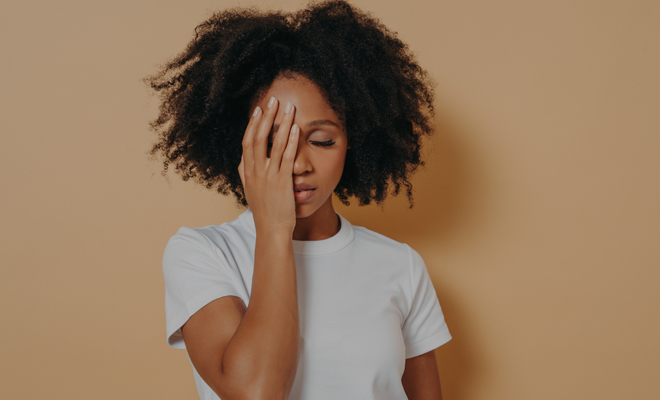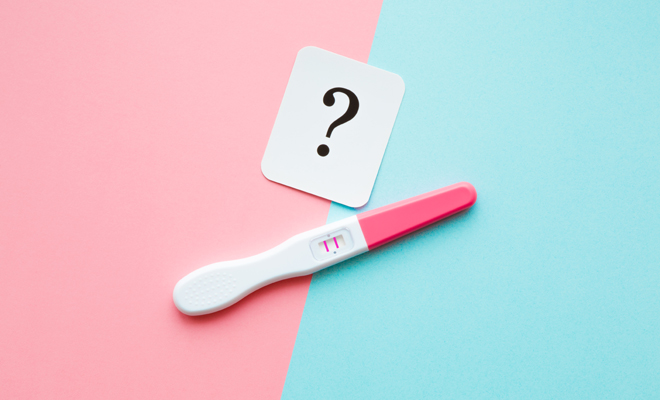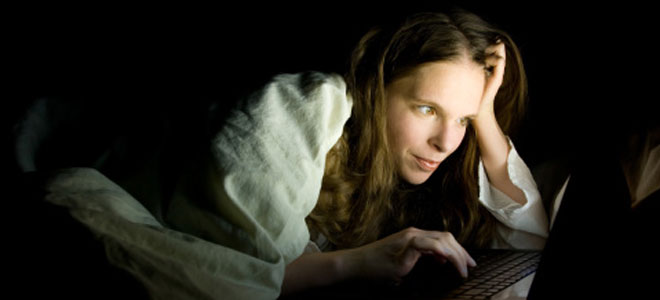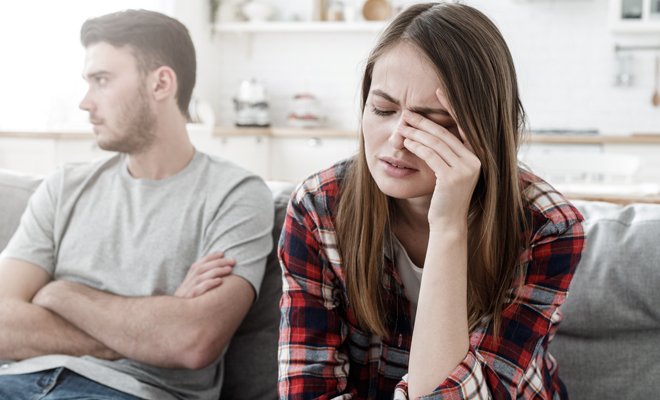Around 40% of the Spanish population will suffer from anxiety problems at some point in their lives and everything indicates that this percentage will increase. The picture in the rest of the world is similar, so it’s time to take anxiety disorders seriously and start getting to know them better.

When we feel significant levels of anxiety, negative effects appear on our body. And it is that its impact goes far beyond the psychological (thoughts and emotions). The skin is one of the organs that can be affected by anxiety, leading to changes in its appearance or even discomfort such as hives or the appearance of acne. How does anxiety show on the skin? What are its terrible effects? We tell you!
What is anxiety and how can it manifest itself?
First of all, let us briefly know what anxiety is. This is usually defined as an emotional disorder according to various sources, but it is important to understand that this is not necessarily the case. Anxiety is a natural state of response to a stressful situation. It is perfectly normal and adaptive. The problem occurs when anxiety manifests itself at very high levels and/or for long periods of time, according to several specialists.
And it is that everything that we do not express, that stays with us and that we keep silent does not disappear by magic. It stays deep within us, waiting to be healed. When this healing does not take place, our body speaks through symptoms that try to make us see that something is wrong with our psyche and that we should pay attention to it.
Our skin is direct contact with the world around us, and what better way for our soul to express what is quiet than through it. For this reason it is not uncommon that when faced with very high levels of anxiety we come to present dermatological problems.
Surely it has happened to you at some time: you have an important event in which you will present yourself publicly, or a photo session, and suddenly a pimple appears on your face. How annoying, right? But have you ever thought that this might have to do with anxiety?
It is something much more common than you may think; but remember that physical symptoms are not something negative. They are simply showing us where we should look and pay attention within ourselves.
Skin relationship with anxiety
When we experience anxiety we can present various symptoms. It is common to associate it with gastrointestinal problems and muscle pain, but its impact on our health is much more complex. Some people may develop symptoms on their skin, such as redness, hives, and acne, among others, when exposed to certain levels of anxiety, as various studies have shown.
It is important to keep in mind that not all skin conditions are due to stress and anxiety, so we recommend visiting a dermatologist if you have problems in this area. Even if your symptoms are due to anxiety, they can prescribe a treatment to help alleviate the symptoms. But it is important that you work on it in therapy in order to understand the root of the problem and acquire new and better strategies to deal with anxiety.
Keep in mind that when you have anxiety, your body chemistry changes. You produce more cortisol, which is the stress-related hormone that can negatively affect the appearance of your skin.
General consequences of anxiety
The consequences of anxiety are very varied and can occur in various areas of your life. Some examples are:
On a physical level
- Headaches.
- Tiredness or fatigue.
- Muscle pains.
- Stomach pains.
- Diarrhea or constipation.
- Nausea and vomiting.
- Chest pains.
- And of course, skin conditions, such as: hives, acne, redness, among others.
On a psychological level
- Stress.
- Difficulty expressing your emotions.
- Irritability.
- Emotional overflow (wanting to cry or scream).
- It can affect your self-esteem and self-perception.
On a social level
- It affects interpersonal relationships.
- It can cause problems with co-workers.
- It directly affects your relationship as a couple.
- Interaction with family can also be affected by anxiety.
Keep in mind that these are just some of the consequences of anxiety. If you present some symptoms it is important to treat it. The more time elapses, the more negative effects it can have on your overall health.
How to treat anxiety skin problems?
To treat anxiety, it is best to see a mental health professional. A therapist can help you understand what is happening to you. In addition, it will give you strategies so that you can adjust and reduce anxiety levels.
Even in prolonged therapeutic processes you can manage to control your anxiety levels. Keep in mind that anxiety never completely goes away and that it is normal for it to occur in some circumstances. However, what is not right is that its levels are so high and for so long that they affect your health.
Along with psychological therapy, we make the following recommendations:
Have good eating habits
Diet is key, not only to have healthy skin, but also to help you control anxiety. Having a balanced diet allows you to maintain a balance that will be reflected in all areas.
Protect yourself from the sun
Regardless of whether you are experiencing symptoms on your skin due to anxiety or not, it is important that you always take care of your skin from the sun’s rays. Always use protector before going out.
Do some sport or physical activity
Physical activity will help you reduce anxiety levels and consequently, reduce the symptoms that appear on your skin. You should not do strenuous days of exercises. With a simple activity like walking, it will suffice.
Hydrate properly
Hydration is very important for general health and dehydration can also affect your thoughts and emotions. In addition, it is essential for the health and beauty of your skin.
Dedicate some time for you
Sometimes it is difficult to have time for ourselves with today’s hectic pace of life. However, having a space for them is a must. It does not require many hours, even if it is a moment a day, a few minutes, dedicate them to yourself and do something that you truly enjoy.
Drug therapy
In some cases drug therapy is necessary. This will help you restore a fundamental balance to manage anxiety assertively. It is not necessary in all cases, but it is important that you take into account that it is an option that your therapists may come up with.
The importance of going to professionals when you have skin problems due to anxiety
If you are experiencing symptoms on your skin due to anxiety, it is important that you go to experts in mental health and dermatology so that you can treat the symptoms at the same time that you investigate their origin in order to heal.
If anxiety shows on your skin, it is because you have probably been experiencing it for a long time now, and it is time to pay due attention to it. Remember that your body speaks to you. Pay attention to him; listen to what he has to tell you. Each symptom you present is the wonderful opportunity that your body gives you to heal wounds.






